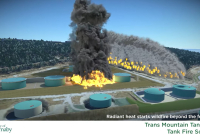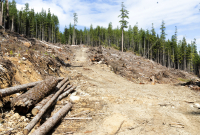Support strong Canadian climate journalism for 2025
Bloc Québécois leader Yves-François Blanchet is throwing his weight behind a First Nation fighting a nuclear waste disposal site near the Ottawa River.
Flanked by three BQ MPs — Sébastien Lemire, Mario Simard and Monique Pauzé — Blanchet reaffirmed the BQ’s support for Kebaowek First Nation’s sustained opposition to the radioactive waste disposal site, located about 190 kilometres northwest of Ottawa at Chalk River Laboratories.
“The Bloc Québécois stands alongside the First Nations, Quebecers and the 140 municipalities who oppose the Chalk River nuclear dump project,” Blanchet said in a party press release, translated from French. “This is an extremely worrying issue, particularly for the health of the St. Lawrence and its entire river network which supplies drinking water to millions of Quebecers.”
Blanchet called on the federal government to immediately suspend the project.
The disposal facility would be about one kilometre from the Ottawa River, which is a tributary of the St. Lawrence. The Ottawa River (known as the Kichi Sibi in Algonquin) holds immense spiritual and cultural importance for the Algonquin people, as well as being a source of drinking water for millions. The Canadian Nuclear Safety Commission approved a construction permit for the project last year.
Canadian Nuclear Laboratories (CNL) wants to permanently dispose of one million cubic metres of radioactive waste in a shallow mound, as a solution to waste accumulated over the last seven decades of operations and in the future. The company said the containment mound will only hold low-level waste.
A former employee at Chalk River told Canada’s National Observer a portion of the waste destined for the mound is a “mishmash” of intermediate- and low-level radioactivity because prior to 2000 there were inadequate systems to properly label, characterize, store and track what was produced at Chalk River or shipped there from other labs. Intermediate-level waste remains radioactive for longer than low-level waste and requires disposal deeper underground.
Kebaowek First Nation is fighting the near surface disposal facility (NSDF) in the political arena and the courts.
The First Nation is waiting for the results of a judicial review it filed earlier this year to try and overturn the Canadian Nuclear Safety Commission’s decision to approve construction of the disposal facility.
Kebaowek argued in court that Canadian Nuclear Laboratories — the private consortium responsible for managing the Chalk River nuclear site — did not secure the First Nation’s free, prior and informed consent during the licensing process, as mandated under Canadian law.
The hearing was in mid-July and Kebaowek First Nation Chief Lance Haymond said a decision is expected by early next year.
In the meantime, CNL — a consortium of private companies (including AtkinsRéalis, formerly known as SNC-Lavalin) — is carrying out pre-construction work.
This includes “blocking black bears from accessing their dens and setting up sound deterring devices to drive away wildlife,” Haymond told reporters on Monday. “These actions are not only illegal under the Wildlife Conservation Act, but violate Algonquin Anishinaabe customary laws and our profound respect for the wildlife that has coexisted with us on these lands for generations.”
Haymond argued that these activities and other pre-construction work should be delayed until the results of the judicial review.
“We filed a complaint with the [Ontario] Ministry of Natural Resources. It's currently under investigation, so we're going to see where that goes, and we're contemplating other legal actions that we may have to take to stop CNL from going ahead and doing these activities until a decision is rendered in the judicial review,” he added.
“The blatant disregard for both law and our traditions displayed by CNL cannot and will not go unchecked,” Haymond said.
In a letter sent to Kebaowek First Nation on Sept. 6, a CNL spokesperson wrote that the company “intends to continue engaging with [Kebaowek First Nation] on the implementation of conditions associated with NSDF, and on ongoing matters at the Chalk River Laboratories site.”
The Bloc and Green Party have been Kebaowek First Nation's strongest allies in their opposition to the near surface disposal facility, according to Haymond.
“The very first party that supported the work that we were doing against Chalk River was Elizabeth May and the Green Party, if you recall, she helped us get a press conference at the national press gallery,” added Haymond. The Green Party and BQ’s continued support has helped keep this issue in the public domain, he said.
Haymond largely credits Sebastien Lemire, BQ critic for Indigenous relations, for bringing the party on board.
Lemire “just so happens to be my provincial MP, and he's always asking us, what are the important files for our communities, for our nation?” Haymond said. “We clearly identified this as one of those important issues and he's taken that to task and has gone inside his caucus and garnered support” from other MPs and now, Blanchet, added Haymond.
“This project is nonsense: in addition to the amply documented dangers, it ignores several security requirements of the International Atomic Energy Agency. Ottawa must immediately withdraw its approval of this project,” said Pauzé in a BQ release.
Ghislain Picard, Chief of the Assembly of First Nations Quebec-Labrador, also attended the press conference and connected the Chalk River project to other systemic issues across the country.
“The NSDF project is emblematic of the broader disregard for Indigenous rights and environmental stewardship in Canada,” Picard said.
“We must stand together to demand justice and protect our shared environment”.
— With files from Matteo Cimellaro
Natasha Bulowski / Local Journalism Initiative / Canada’s National Observer






Comments